Locations
The Idea of the Roaming College
The idea of a college that goes to learn about specific issues in those places where people have gathered some experiences on precisely those issues is one of the central methodological principles of the ewec course.Previous experiences have proved that learning at the place of experiences is both attractive and sustainable. Attractive because students who learn about Europe usually like to get to know Europe and the realities of women living in different corners of Europe.
Therefore the ewec course brings its students to Prague, Barcelona, Boldern, Brussels, Vienna and Berlin. Linking special themes with special places and people also enforces sustainability of the learning experiences as it creates an emotional and existential link with the various issues discussed during the modules.
Most important however it creates a sense of togetherness or belonging in Europe, a sense of mutual responsibility and a wish to shape this new Europe.
Learning by travelling is an old pedagogical insight. A roaming college gives students a chance to establish an emotional relationship to the issues to be learned.
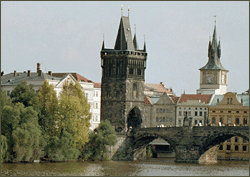
Prague
Located at the historic crossroads of cultures, languages and nations; Prague has always fulfilled the function of a vital and vivid center of Europe.The emancipation of Czech women in the 19th century was closely related to national emancipation. Women were those to make the Czech language and literature rise from the language of servants to a language of literature and literary history. It is not by mistake that every pupil remembers the name of Bozena Nemcová as the best-known Czech female writer. It is still important to mention other names of the younger generation, at least Karolina Svetlá and Eliška Krásnohorská, who in 1890 founded Minerva as the first girls’ high school in Central Europe based on the idea of female education. In 1903 a Czech Women’s Club was started with a number of future female politicians as its members. At the beginning of the 1930s, the Club built – thanks to finances from collection – a center rich in concepts: library, accommodation, lecture hall, restaurant and meeting rooms, which unfortunately could be used by Czech women only for about ten years. All recent activities by women’s organizations aiming at getting back the building (situated in the heart of Prague) remain without success.
In today’s Prague women therefore can only visit the much smaller space of Gender Studies, o.p.s. library; which is however the largest specialized library of its kind in Central and Eastern Europe.
Boldern
Boldern, located above Lake Zürich, is a Protestant Academy and adult education center with a proven record in interreligious programmes, particularly developing women’s perspectives on interreligious issues. It cofounded the European Project for Interreligious Learning (between Christian and Muslim women) and served as project coordinator for the pilot project 2002 – 2004.Together with several other centers it organised and implemented the first interreligious theology course for women (2002-2003), which focussed on ”Issues of conflict and potentials for peace building in monotheistic religions“. Leadership of the course was in the hands of a team of Jewish, Christian and Muslim women. A second course will be run in 2005.
Boldern is close to the city of Zürich, Switzerland’s small metropolis, which has a Muslim population of nearly ten percent (5% for the whole of the country). There are active interreligious relations and programmes, carried out by the city’s offical “Forum of Religions“, and by a number of people’s initiatives, including women’s groups.
Generally, Switzerland offers a particular experience in dealing with multiculturalism, and with its federal structure and its principle of subsidiarity has developed models and procedures of how to deal with difference in a fair and sensitive manner.
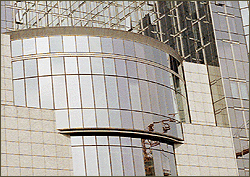
Brussels
Brussels is the logical venue for a seminar on European institutions and policies as both most EU Institutions and European NGOs are located there.Brussels, however, is not only the capital of the EU, but also the capital of the kingdom of Belgium with a long history and beautiful and interesting places to be seen. One cannot leave Brussels without having seen the Manneken Pis, the Atomium or some Art Deco buildings.
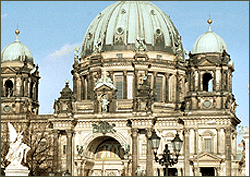
Berlin
With its special history Berlin is one of the most dynamic places in Europe today. Its geographical location in the middle of Europe offers the chance to get to know opportunities and problems, fears and hopes towards European enlargement. The rich diversity of Berlin and its multicultural population on the one hand, the increasing economic poverty and unemployment, the growing informal labour market and everyday violence (e.g. trafficking of women) on the other hand makes it possible to learn about the potentials and problems of integration and the influence of gender, class and culture in these processes. Berlin as a political centre and its vital civil society offers a space for exchange and intercultural dialogue in all these fields.Since the late 60s Berlin has become also a centre of the development of the new and second (West-)German women’s movement. The first feminist summer academies became a focal point for the development in feminist research, theory and praxis. In the 80s Berlin became the heart of the “Women’s Project Movement“ with its alternative approaches towards violence, women’s rights, health, economy etc. The Berlin based Heinrich Böll Foundation developed as a pioneer organization the approach of Gender Democracy in the 90s, which is also a key focus of the work done by the Gender Competence Centre, located at Humboldt University, or by the Human Rights Institute.
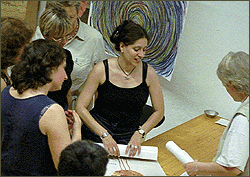
Barcelona
Spain in general has a significant feminist history, a history that the long dictatorship of General Franco from 1939 to 1975 was ultimately unable to suppress. Few know that the government of Second Republic prior to the Spanish Civil War was one of the first in the world to appoint women as ministers of government (Margarita Nelken, Federica Montseny…).Although the years of the dictatorship were long, after the death of Franco the women’s movement in Spain emerged in full force. Whilst the politics of equality continue to have an important impact on Spanish structures and society, over the past decade there has been an important debate in relation to the thinking and politics of sexual difference developed in Italy by the Milan Women’s Bookstore and the philosophical community Diotima. It has been Duoda, the Centre for Women’s Studies at the University of Barcelona, that has acted as a fundamental site for the development of this politics and its extension in Spain, where it has had significant repercussions, offering as it does a completely womancentred perspective, and leaving behind, in a certain way, the politics that seek to establish equality with men without dismantling patriarchal structures and challenging the symbolic order created by the same.
At the same time, Barcelona is itself, as a city, an exciting hub of cultural and social activity and political commitment in terms of women and feminism. There are many groups of women working together on a diversity of projects. There is a women’s bookshop, which is at the same time a place of encounters, seminars and debates.
There is an important project underway to create a large cultural women’s space. There are women’s events, large and small, constantly in preparation, both on a local, Catalan, level and a national level. There are important debates taking place in interreligious women’s groups.
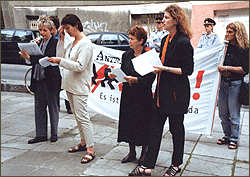
Vienna
At first glance Vienna appears to be a very traditional place, steeped in cultural treasures. People come to enjoy art galleries, cafes, concerts, ballroom dancing and the beautiful architecture. But this is just one of Vienna’s facets. If you dig a bit deeper and search for women’s history you will find both fascinating foremothers and a rich variety of feminist work and thought taking place in today’s Vienna.Did you know that Bertha von Suttner (1843-1914) was not only the first woman who got the Nobel Peace Prize but also published a manifesto against a male dominated language. Her companion Rosa Mayreder (1858-1938) was one of the first gender theorists and a cofounder of several women’s projects. Käthe Leichter (1895-1941), an important leader in the workers’ movement, published a pathbreaking study on the realities of industrial women workers and established a women’s department within the Chamber of Labour.
During the 2nd wave of feminism it was mainly the autonomous women’s movement that challenged some of the more traditional parts of society. Austria’s first feminist magazine – AUF! – was founded; a feminist archive was set up; several independent working groups of university women were established, a women’s bookshop and a women’s centre was opened – and all of this still exists.
In the late 90s Austrian Women’s Organisations suceeded in lobbying for new legislation which provides more effective protection for victims of violence and ensures that the perpetrators bear the consequences of their actions and can be evicted from the home.
Recent neoliberal political trends have reinforced Austrian women’s activities in the field of economics and social policy. An economic literacy programme for women was developed by some women economists, while others did research on feminist budgeting, deconstructed some patriarchal economic myths or mapped out ways out of women’s poverty.
A referendum on women’s rights was held in the late 90s and at the beginning of the 21st century a network of many women’s organisations put together a feminist political programme, raising awareness for existing feminist alternatives in all areas of politics, from education, internal and external affairs, to economy, agricultural, social and labour market policies, as well as state budgeting, cultural and health agendas.